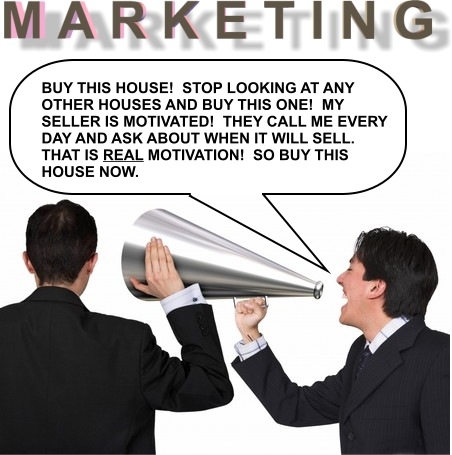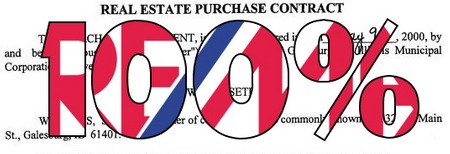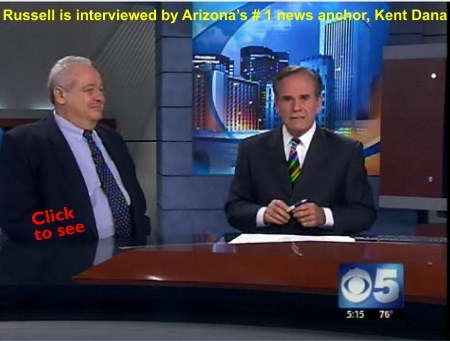
This post is in response to my last one. I had no idea it would be so well received. Having surveyed only myself, to me it was a post I tossed off. This post consists of the responses to the questions and points raised.
I want an iRuss also! A mini iPod crammed full of Russell Shaw podcasts and videos… You know, there could be some $$ that idea…
Go to this page and load yours up. Scroll down to the lower half for the audio and video content.
sometimes as we are at the appointment, we learn about things that cause us to NOT take the listing. Honestly, it is more us not TAKING it than us not GETTING it. My business plan does not allow me to take a listing that is overpriced or in a condition (physically/financially/emotionally … ) where I do not think that I can do the BEST by my seller clients.
I believe the information here is the most important, most vital, high impact information there is for stable success. Here is one of the sample emails I send out every month to invite agents in the Phoenix area to one of the talks that I give every month. There are four different talks that I give and at the end of the 4th month I start over with talk number one. Since April of last year I have given one of these talks to over 1,200 agents, at about 15 agents at a time (that is a lot of talks:-)
1. Did you discover new reasons to turn down a new listing?
2. Was there an area harboring more than their share of unsold listings?
3. Was there a pattern showing numbers of bedrooms/bathrooms (or other physical attributes or lack thereof) being shunned by buyers?
4. Was there a particular (and discernible) seller mindset hindering the sales process?
5. Was there an area/neighborhood which was, for some reason, consistently listed over market value?
We don’t have new reasons to turn down a listing. We have the same reasons we have always had: bad seller or a bad price. If the seller exhibits a majority of the 12 characteristics covered here I don’t want their business at any price. Even if a “nice” person, it is necessary for them to price the house at or below the water line. Once we can see we are fishing with our bait out of water we must get the price lower. Sellers who can’t or won’t reduce have a listing that isn’t going to sell. Therefore, they cancel or we do. There is always some price point at which it would sell, in any market. If they are really serious, we can and will find that point.
I often hear remarks from agents like, “the bank sold that house really cheap – 30% below market value”. I don’t agree with that kind of statement. If various banks are the only sellers selling in an area and they are selling all of their houses at a perceived “below market” sales price – perhaps that IS the market for that product in that area. A good price fixes any of the various bad conditions. There is no good reason to take (or keep) a listing that isn’t going to sell.
Speaking of keeping records, what does a Millionaire Real Estate Agent use to do just that?
We use Agent Office for our transactions, ACT for all of our names and addresses, etc., and Excel to keep the production numbers.
Pricing is a crap shoot and we don’t get the list price until it hits the market and that’s well into the process. Sometimes they’re priced well right off the bat, sometimes they’re not. If they don’t sell, the bank keeps lowering the prices until they do, so that’s not such a big deal.
Correct, pricing IS a crap shoot. This is true in both a rising and in a declining market. In a stable or slowly rising market (like we used to have before 2005 when we could use “comps”) we all pretty much knew how to price a property. Now we really are guessing. Sometimes pretty good guessing and it seems currently to be as much an art as a science. That will only be true until the market stabilizes and then it will only be the super high end and unique homes that it will still be an art to correctly price. Now it is most homes in our area.
And from this jewel, this:
Whatever it is, people are on edge. Have you noticed?
Yes, I have. Many people in our industry have been very very stressed. Everyone has stress points. Everyone. No matter how easily any given person confronts and handles situations that make others marvel at their ability, that person has something they don’t easily confront. That thing or situation is then capable of causing them stress. They are transmitting those feelings to pretty much everyone they come into contact with and those people in turn are passing that energy along to others, etc. People are calm and relaxed when they feel they can confidently predict what is going to occur – what is about to happen. When their prediction goes out there goes their certainty. Once certainty is gone it doesn’t take much to then feel stressed.
What is “stress” but too much environment pushing against the person than there is of the person to push back? When there is enough of “I” (you) there to push back at whatever is pushing – no problem. A big cut in income alone is usually enough to cause most to be on edge nonstop. When a person feels out of control of a situation the very best thing they can do is to deal exclusively in certainties. What do you know is true? What is for sure? Concentrate on those things. Look around and find other things and ideas that you are certain are true. When you see something you are not certain of – recognize that fact. Don’t pretend to know things you don’t know – if you aren’t certain (based on direct observation) know that you don’t know it. That not knowing is – in itself – a form of certainty.
When you are not feeling “up” recognize that fact. There are things you experience in your life that bring you up. Take a walk, call a friend, eat something you like, buy some new shoes, whatever gives you a “lift”. What are those activities for you? Make a list (lists?) of them. Really. Write down fun stuff you like doing. Things that are simply fun and make you happy. If possible, make it a point to do some of those things every day. You want something that will help you have a better business? Get in a good mood and then make your business decisions.
 One of the true pioneers of what is referred to in marketing as “positioning” is Al Ries. Al Ries and Jack Trout wrote the groundbreaking book, “Positioning, The Battle for Your Mind“. It is probably the most influential book on advertising ever written. That statement is on the cover of their 20th anniversary edition of their book. I really doubt anyone who knows much about marketing or advertising would dispute it.
One of the true pioneers of what is referred to in marketing as “positioning” is Al Ries. Al Ries and Jack Trout wrote the groundbreaking book, “Positioning, The Battle for Your Mind“. It is probably the most influential book on advertising ever written. That statement is on the cover of their 20th anniversary edition of their book. I really doubt anyone who knows much about marketing or advertising would dispute it.






